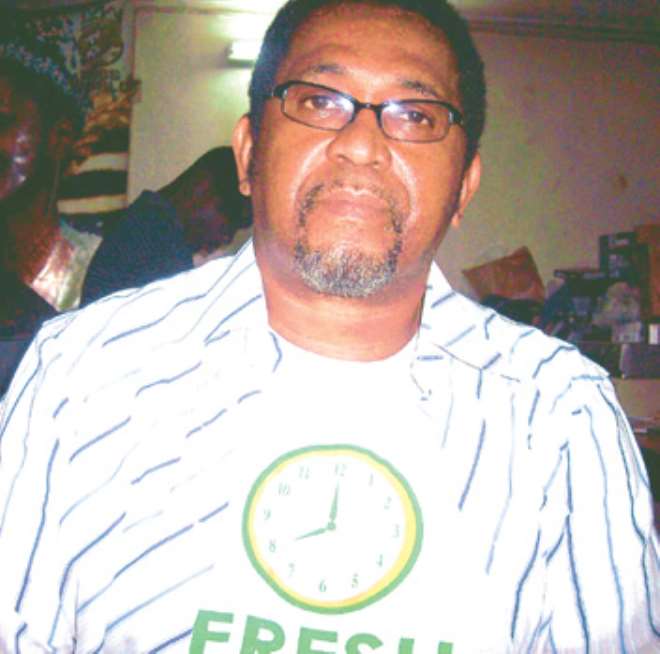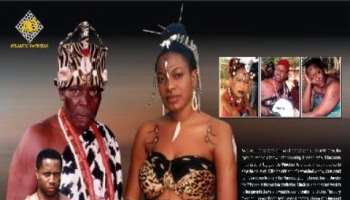‘I’M FIRST AND FOREMOST A BROADCASTER, I’M ONLY FORTUNATE TO BE AN ACTOR’
Patrick Doyle needs no introduction to many people. For many decades, he has been in the public's eye. He is regarded as a quintessential television presenter who brought humour into the job even in the course of dealing with some serious issues.For this, he has won many awards. His healthy sense of humour has seen him through many programmes, and has made him one of best presenters around. Being multi-talented, Doyle has also featured in many home videos. Having seen it all for many decades, he is taking it low now. Okorie Uguru met him and he spoke about his career, wife and more.
At the home front, Doyle is married to the delectable Iretiola Doyle, whom many know as the funny, irrepressible Caro in Amaka Igwe's Fuji House of Commotion. One wonders how a home with a couple endowed with a high sense of humour would be like. Doyle would however, not see it that way. He believes that the public perception of his wife as seen in the Fuji House may not be totally correct. To him, his wife is a good actress who can translate her role very well; not because she is humorous in real life. He however attributes his own sense of humour to his background. "In my own case, if you examine my name, you'll see that Patrick Doyle is not a Nigerian name; and it is not a borrowed name. My great grandfather was Patrick Doyle, my grandfather was Patrick Doyle, and my father was Patrick Doyle. Irish people are reputed for having a fantastic sense of humour. Maybe the reason for my being humourous is because my great grandfather was an Irishman. Funny enough, my wife is not a humorous person, she is the serious type. What makes her looks like a humourous person is because she is a good actress. When she was given a role to portray herself as being humourous, she acted the script perfectly well. She was the same person who acted in Sitanda as a serious warrior princess. That is more of her real character than the role she plays as Caro of Fuji House of Commotion, but because she is a good actress, she carries out whatever role you give her very professionally. So, she is a very serious person."
Was it planned that the couple would be in the same industry? "It is not planned, it is by providence. You will take love wherever you find it. If she was a pepper seller, I'm sure I would love her just as much as I do right now."
For a person who started broadcasting at the age of 20, Doyle has come a long way. But would he describe himself as a broadcaster or an actor; seeing that he is quite versatile in both, he said: "I 'll describe myself as broadcaster whenever there is a form to feel and there is a column for occupation. I'm first and foremost a broadcaster; I'm fortunate that I've had the opportunity to express my self as an actor, because that would be insulting people who are trained to be actors; whose only means of livelihood is acting. So, I'm a broadcaster who can act. The same thing happens to some actors and musicians who have the ability to present programmes, they are first and foremost musicians or actors, not broadcasters."
After so many years as a regular face on the tube, Doyle appears to have taken a back seat and involved himself more with production. He gave the reason: "The last programme I presented was in 1997; that was 10 years ago. So, I've stepped back; I don't like competing with the young ones. I inspire these young people; you cannot inspire someone and be the person's rival at the same time. It is only appropriate at this time to take a back seat. But once in a while when I get the chance to present a programme or a show, I'll do it."
For a person who went into broadcasting when the government was the sole owner of electronic media, to the current open industry with a lot of privately-owned station, how does Doyle see it? For him, it is a welcome development."There is no doubt that production values have increased with the private televisions and radio stations. It is a welcome development. They have provided an avenue for many people in the business to express themselves. Before now, because most of the television and radio stations are government owned, all we heard was government propaganda. But, with the advent of the private television stations, we have been treated to some very exciting content; they are fulfilling their roles."
Doyle is not happy with the way Mexican soap operas have become a fad among Nigeran television viewers. He calls these soaps dubious because, "first of all, the acting on those films is sub-standard; the production valuesare sub-standard; the plots are implausible, but for some reasons, Nigerians seem to like it. I think that sometimes, when you like something, it is not because it is good but because you have been over-exposed to it. So, you begin to find an affinity with it. You know a situation where a kidnapped victim falls in love with her kidnappers. What has happened is that our minds have been kidnapped by advertising agencies and people who acquire these programmes and they inundate us. So, we are forced to like it; it is bad for us; it stunts the growth of our own television production industry. In fact, it is affecting us very badly, and the sooner there is a legislation to deal with it, the better. The regulatory agencies like the National Broadcasting Commission, the National Video and Censor Board, and the Ministry of Information have to do something about it; it is wrong."
When told that there might be something interesting in these soaps that has made them a hit among many Nigerians, Doyle would rather not buy that. He said: "There is absolutely nothing in their story lines that make any type of cultural or emotional connection with the Nigerian psyche, absolutely nothing. As I said, they are poor plots but because we have been inundated; these people buy them very cheaply. Because for them, it is cheaper to buy a 1980 Mexican soap opera for maybe, a couple of hundred dollars to fill the hours, than to give a Nigerian producer money to produce a programme. What we are suffering from is the cheap attitude of the advertising agencies in Nigeria and television stations not willing to be commited towards the development of our television production industry. There is nothing good about these soap operas. I'm yet to see a Mexican soap opera that will resonate with the Nigerian audience more than Mirror in the Sun, Cock Crow at Dawn, Ripples, Jaded Options, Mega Fortunes; I'm yet to see it."
Doyle believes the dearth of high quality local soap operas like what obtains in the '80s was a result of this foreign influx of Mexican soaps. "If you recall, these hideous Mexican soap operas started coming to Nigeria around '80s. What has happened is simple; the unpatriotic Nigerians running our advertising and television industry inundated the Nigerian audience with it. By so doing, killing the initiative to produce good programmes such as Mirror in the Sun, and what have you. For me, it was a calculated campaign by some cheap advertising agencies to find a cheap way of exposing commercials. That is what has happened. The same people who did Mirror in the Sun are alive, the same people who acted it, they are here; if any thing, they are more seasoned. So, if you could fund them, they will replicate it. The reason why things are bad is because the true professionals have been forced out of business, and opportunists who have failed in Nollywood are producing soap operas."
Although Doyle believes Nollywood has done a lot for Nigeria, especially the youths, thematically, he believes it has been a disaster. "Nollywood thematically is one of the biggest failures of all times. However, in an economic sense, it has been tremendous as an employer of labour, as something to hold the attention of young people and restrain them from being involved in crime because it provides employment for hundreds of young Nigerians. So, all told, Nollywood has been a blessing to the Nigerian people, and indeed to the black race because it has triggered the motion picture industry in many other African countries. But in terms of theme, it has betrayed the intellect of the Nigerian people. This is a country that produced a Wole Soyinka, a Chinua Achebe, a Professor Ola Rotimi, who are titans in literature. When you look at the scripts, that formed the backbone of the Nollywood stories, you begin to wonder whether these are the same Nigerians who produced the likes of Wole Soyinka of this world.'
Finally, having been in the public eye for many years, one was curious to know a little more about his family. But he would have none of it. He retorted, "It is Patrick Doyle that the public sees, and it is Patrick Doyle that the public has business with. My wife works with the public; the public sees her, that's enough of the Doyles' business in the public domain. The other business should remain because I am not the only Doyle in this country and in the world. So, let me not use the unfair advantage that I have, media exposure to bring undue attention to the Doyle family."
Latest News
-
 "If You're For Me, I Am For You" - Cubana Chief P
"If You're For Me, I Am For You" - Cubana Chief P -
 "3 Days To Go" - Femi Adebayo Urges Fans To Get S
"3 Days To Go" - Femi Adebayo Urges Fans To Get S -
 "Stop Asking Me Questions About Speed Darlington"
"Stop Asking Me Questions About Speed Darlington" -
 "Benue Is The Most Underdeveloped State I've Ever
"Benue Is The Most Underdeveloped State I've Ever -
 Stan Alieke Urges Young Professionals To Take Lin
Stan Alieke Urges Young Professionals To Take Lin -
 Chizzy Alichi Teases Fans With Baby Reveal, Promot
Chizzy Alichi Teases Fans With Baby Reveal, Promot -
 "I'm Not Wearing Makeup From July 4th Till Decemb
"I'm Not Wearing Makeup From July 4th Till Decemb -
 "Stop The Challenge Of Mocking Kids With Down Syn
"Stop The Challenge Of Mocking Kids With Down Syn -
 Regina Daniels Celebrates Sons As They Mark Birthd
Regina Daniels Celebrates Sons As They Mark Birthd -
 Speed Darlington Threatens To Sue NAPTIP For Defam
Speed Darlington Threatens To Sue NAPTIP For Defam














